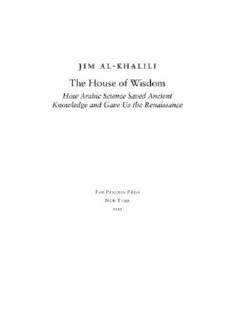
The House of Wisdom: How Arabic Science Saved Ancient Knowledge and Gave Us the Renaissance PDF
Preview The House of Wisdom: How Arabic Science Saved Ancient Knowledge and Gave Us the Renaissance
Table of Contents Title Page Copyright Page Dedication Epigraph Preface Chapter 1 - A Dream of Aristotle Chapter 2 - The Rise of Islam Chapter 3 - Translation Chapter 4 - The Lonely Alchemist Chapter 5 - The House of Wisdom Chapter 6 - Big Science Chapter 7 - Numbers Chapter 8 - Algebra Chapter 9 - The Philosopher Chapter 10 - The Medic Chapter 11 - The Physicist Chapter 12 - The Prince and the Pauper Chapter 13 - Andalusia Chapter 14 - The Marāgha Revolution Chapter 15 - Decline and Renaissance Chapter 16 - Science and Islam Today Notes Glossary of Scientists Timeline: The Islamic World from Antiquity to the Beginning of the Modern Period Index THE PENGUIN PRESS Published by the Penguin Group Penguin Group (USA) Inc., 375 Hudson Street, New York, New York 10014, U.S.A. Penguin Group (Canada), 90 Eglinton Avenue East, Suite 700, Toronto, Ontario, Canada M4P 2Y3 (a division of Pearson Penguin Canada Inc.) • Penguin Books Ltd, 80 Strand, London WC2R oRL, England • Penguin Ireland, 25 St. Stephen’s Green, Dublin 2, Ireland (a division of Penguin Books Ltd) • Penguin Books Australia Ltd, 250 Camberwell Road, Camberwell, Victoria 3124, Australia (a division of Pearson Australia Group Pty Ltd) • Penguin Books India Pvt Ltd, 11 Community Centre, Panchsheel Park, New Delhi-110 017, India • Penguin Group (NZ), 67 Apollo Drive, Rosedale, North Shore 0632, New Zealand (a division of Pearson New Zealand Ltd) • Penguin Books (South Africa) (Pty) Ltd, 24 Sturdee Avenue, Rosebank, Johannesburg 2196, South Africa Penguin Books Ltd, Registered Offices: 80 Strand, London WC2R oRL, England Copyright © Jim al-Khalili, 2010 All rights reserved Illustration credits appear on pages xi-xii. Library of Congress Cataloging-in-Publication Data al-Khalili, Jim. The house of wisdom : how Arabic science saved ancient knowledge and gave us the Renaissance / Jim al- Khalili. p. cm. Includes bibliographical references and index. eISBN : 978-1-101-47623-9 1. Science—Arab countries—History. 2. Science—Philosophy—History. 3. Science, Medieval. 4. Science —Methodology—History. 5. Arab countries—Intellectual life—History. 6. Science, Renaissance. I. Title. Q127.A5A4 2011 509.17’67—dc22 2010053136 Without limiting the rights under copyright reserved above, no part of this publication may be reproduced, stored in or introduced into a retrieval system, or transmitted, in any form or by any means (electronic, mechanical, photocopying, recording or otherwise), without the prior written permission of both the copyright owner and the above publisher of this book. The scanning, uploading, and distribution of this book via the Internet or via any other means without the permission of the publisher is illegal and punishable by law. Please purchase only authorized electronic editions and do not participate in or encourage electronic piracy of copyrightable materials. Your support of the author’s rights is appreciated. http://us.penguingroup.com To Julie He who finds a new path is a path finder, even if the trail has to be found again by others; and he who walks far ahead of his contemporaries is a leader, even though centuries pass before he is recognized as such. Nathaniel Schmidt, Ibn Khaldūn List of Plates 1. Abbasid Caliph Harūn al-Rashīd and King Charlemagne, oil painting by Julius Koeckert (1827-1918). (Maximilianeum Foundation, Munich) 2. Hārūn al-Rashīd and the barber in a Turkish bath, fifteenth-century oil painting. (British Library, London, UK/ © British Library Board. All Rights Reserved/The Bridgeman Art Library) 3. The ruins of the eighth- century Abbāsid Palace of Ukhaidhir, south of Baghdad. (alimdi.net/photographersdirect.com) 4. The spiral cone minaret of the Sāmarra mosque. (Thomas J. Abercrombie/Getty Images) 5. The ruins of the tenth-century palace-city complex Medinat al-Zahrā’, outside Córdoba. (Medjai) 6. Description of the eye in Hunayn ibn Ishāq’s Ten Treaties on the Eye. (The Art Archive/Kharbine-Tapabor/Boistesselin) 7. Brass astrolabe from Saragossa (c. 1079-80). (Germanisches Nationalmuseum, Nuremberg (Nuernberg), Germany/The Bridgeman Art Library) 8. A trickster in eleventh-century Baghdad; thirteenth-century painting. (Institute of Oriental Studies, St Petersburg, Russia/ The Bridgeman Art Library) 9. Page from the Canon of Medicine by Ibn Sīna. (Wellcome Library, London) 10. Medieval Muslim surgical instruments, from Kitab al-Tasrīf. 11. Eleventh-century Balkhi-style map of northern Iraq. (The Art Archive/National Library Cairo/Gianni Dagli Orti) 12. Al-Idrīsi’s twelfth-century map of the world. 13. Copernicus’ heliocentric universe. (Mansell/Getty Images) 14. Ptolemy’s geocentric universe as it appears in the Almagest. 15. Diagram of a solar eclipse, from an eleventh-century manuscript of al- Karkhi. (The Art Archive/Kharbine-Tapabor/Photo Boistesselin) 16. A map from the Book of Routes and Provinces. 17. Ibn al-Shātir’s sundial, Umayyad Mosque, Damascus. (Billbl) 18. The Banū Mūsa brothers’ self-trimming lamp. (The Art Archive/ National Library Cairo/Gianni Dagli Orti) 19. The Elephant Clock of al-Jazari. 20. The inner workings of the Elephant Clock. 21. Diagram of a system for pumping water into a basin, from the Book of Knowledge of Ingenious Mechanical Devices, by al-Jazari (1206). (Topkapi Palace Museum, Istanbul, Turkey/ The Bridgeman Art Library) 22. The campus of King Abdullah University of Science and Technology (KAUST), Jeddah. (Matin Durrani/‘Buying success, Saudi style’, Physics World, November 2009)
